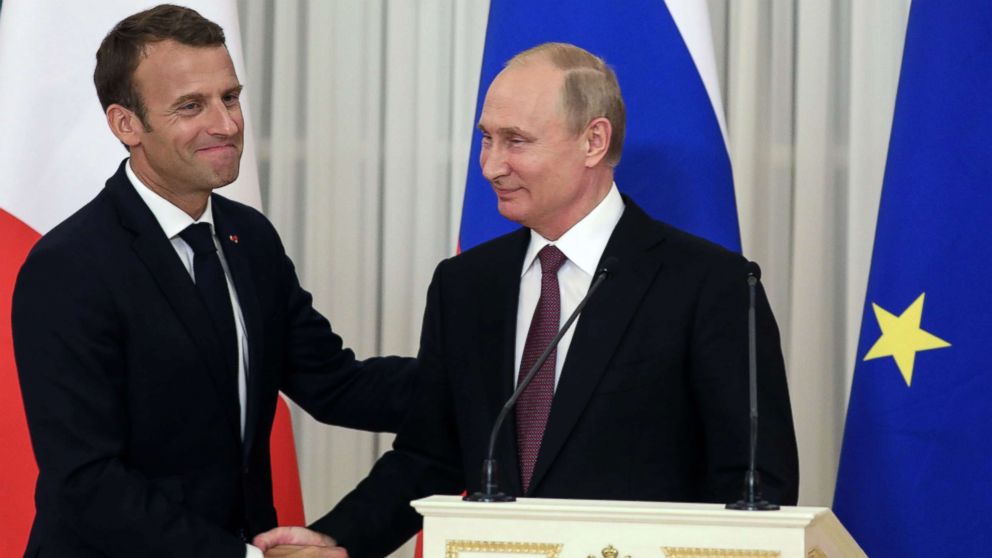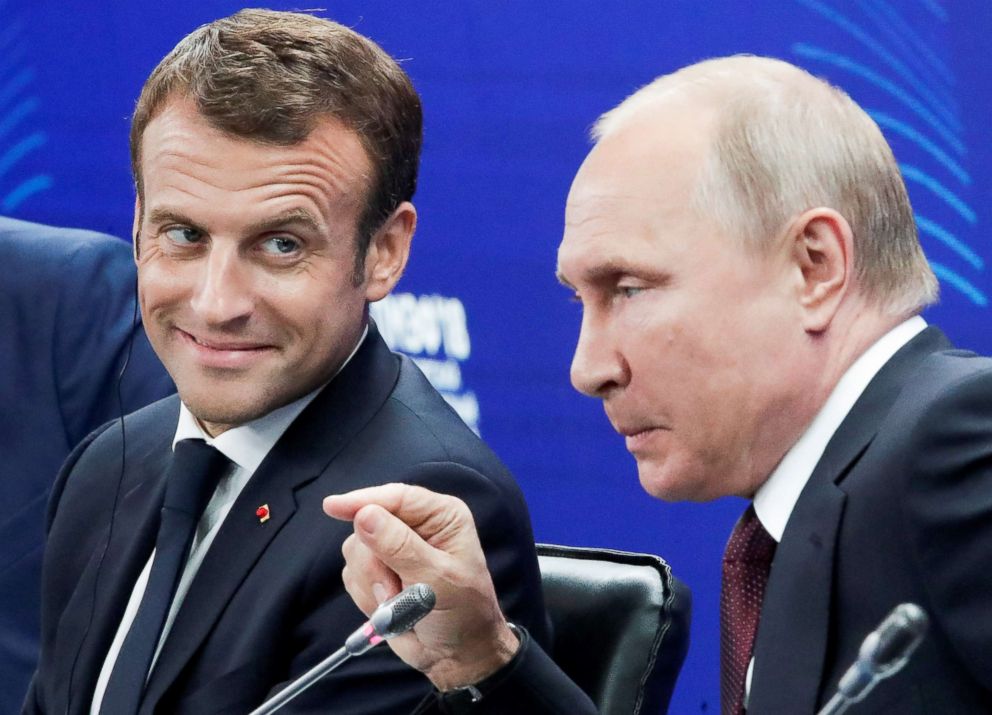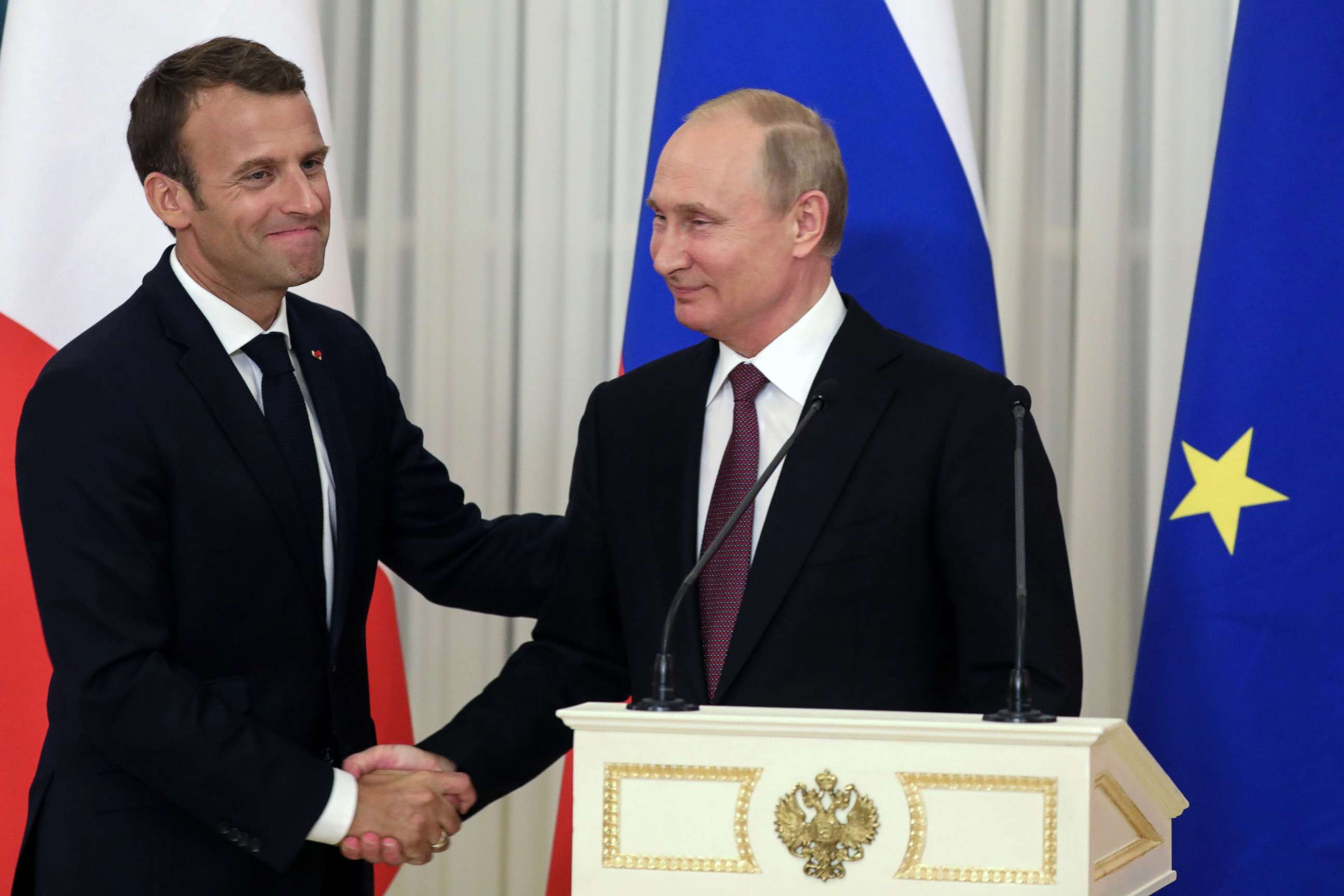Macron tries to woo Putin during state visit
Macron was in St Petersburg for the second day of the visit

Saint Petersburg, Russia -- France's president Emmanuel Macron on Friday used a state visit to Russia to mount an energetic charm offensive on President Vladimir Putin.
The two leaders rubbed elbows in a series of appearances at an economic forum in Saint Petersburg, but repeatedly stumbled on some of the stark disagreements that have set Russia and Western countries at odds with one another.
Macron has said the trip is intended as an attempt to refresh relations between Russia and Europe that have been sinking steadily into tensions reminiscent of the Cold War, fuelled by clashes over the Ukraine crisis, Russia's role in Syria and most recently the poisoning of a former Russian double agent in Britain.
For some, Macron’s trip was a reprise of his visit to the White House in April where his delicate handling of President Donald Trump prompted some commentators to call him “the Trump whisperer”.
On his trip to Russia, Macron turned his efforts to Putin. He was studiously respectful of Putin, filling his speeches with references to Russian culture and nods to Putin’s personal history. Throughout the trip, the two have referred to one another as “Cher Vladimir” and “Dear Emmanuel”.
In a speech on stage with Macron told an audience that he was convinced "Russia has its history and its destiny in Europe” and urged Putin to embrace it.
“I am ready,” Macron told Putin. “The window of opportunity exists, it is now, and if we don’t take it, it can close again.”
The Trump administration's withdrawal from the Iran nuclear deal last month for some observers has created an unusual moment for Europe and Russia to try to make a return to more normal relations. France, along with the UK, Germany, and China, shares Russia's desire to preserve the Iran deal and the countries have said they are seeking was to mitigate the impact of American sanctions that will now be re-imposed.
Against that backdrop, Macron found himself praising the merits of multilateral diplomacy to Putin. Macron, who has presented himself as a straight-talker and muscular liberal, urged Putin to play by the rules of an international order based on cooperation, but couched it in terms meant to appeal to the Russian leader.
“We all know your taste for judo, dear Vladimir — it is based on mastery of one’s own strength and respect for one’s opponent,” Macron said, referring to Putin's well-known passion for the martial art (he is a black-belt). “Let us emulate these principles in the international arena. Let us play a co-operative game, a joint game," he said, saying his favorite game was soccer.
For his part, Putin seemed at turns pleased, but also amused and skeptical of his guest, treating him as precocious. His use of “Dear Emmanuel” at times appeared tongue-in-cheek. After Macron's comments about judo, Putin responded: "Such a situation in the world has come about, that everyone is playing soccer, while applying the rules of judo. It's neither soccer, nor judo. It's just chaos."

But even as Macron sought to improve relations with Putin, one of the conflicts behind the tension in Russia and Western relations intervened. The Netherlands and Australia announced they hold Russia responsible for the shooting down of Malaysian Airlines flight MH17 over eastern Ukraine in 2014, that killed 298 people. A day earlier, a Dutch-led four-year long international investigation found that the missile used to bring down the airliner belonged to a Russian anti-aircraft brigade.
The Netherlands and Australia, whose citizens made up the largest number of the dead, urged Russia to accept responsibility and warned they might try to hold Russia accountable in an international court. The call was backed by the U.S. and Britain.
Russia previously has denied any role in the shooting down, despite mounting evidence from the Dutch-led investigation and independent researchers that it had been a Russian missile, fired by pro-Russian separatists who mistook the airliner for a Ukrainian military plane. On Friday, the independent research group, Bellingcat, that has unearthed considerably evidence around MH17 from open source materials, claimed to have identified a Russian intelligence officer as a key person of interest.

On stage with Putin, Macron urged him to accept responsibility for the shooting down. But Putin again flatly rejected the missile was Russian and said Moscow would not accept the investigation since it had not been included in it.
The exchange underlined the limits of what Macron’s outreach is likely to produce. His critics have already pointed out that his supposed deft touch with Trump yielded no result, with Trump nonetheless withdrawing from the Iran deal despite Macron's efforts to dissuade him.
At the forum in St. Petersburg, which gathers virtually all of Russia's business and political elite, much of the focus was on France's strong economic relations with Russia in spite of the European Union and U.S. sanctions that were imposed following Russia's invasion of Ukraine in 2014. With Macron's presence many Russian and French executives speaking at the forum spoke hopefully of a waning impact from the sanctions and a desire for a return to business as usual.
But following the conference though, there was little sign much would shift around the sanctions. At a news conference, Macron reiterated that France would not remove its sanctions on Russia unless there was progress on the Ukraine conflict.
"The ball is in the camp of Russia and Ukraine," Macron said, according to Reuters. "It's as simple as that. We won't lift the sanctions if nothing's done. That's what we discussed with Vladimir Putin."




